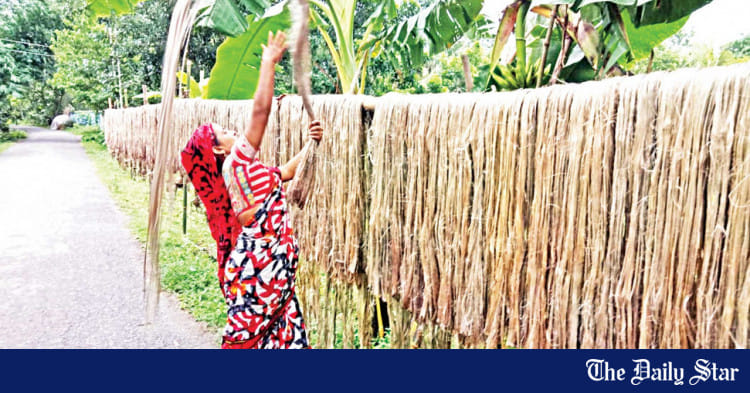Saif
Senior Member
- Joined
- Jan 24, 2024
- Messages
- 17,281
- Likes
- 8,334
- Nation

- Residence

- Axis Group


Bangladesh exports jute, jute goods worth $1.2 bn | Bangladesh
Bangladesh has exported jute and jute goods worth $1.2 billion in the last fiscal year as the sector contributes 1.4% to the country’s Gross Domestic Product (GDP).<p>"Jute contributes 1.4% to the GDP and 26% to agriculture," Director General of Bangladesh Jute Research Institute (BJRI) Dr Md...
Bangladesh exports jute, jute goods worth $1.2 bn
Bangladesh has exported jute and jute goods worth $1.2 billion in the last fiscal year as the sector contributes 1.4% to the country's Gross Domestic Product (GDP).

Bangladesh is the second largest producer of jute in the world with an estimated average annual production of 1.44 million tonnes. File photo
"Jute contributes 1.4% to the GDP and 26% to agriculture," Director General of Bangladesh Jute Research Institute (BJRI) Dr Md Abdul Awal told a workshop in Dhaka, according to a handout.
The BJRI organised the workshop on "Progress, obstacle and doings of jute sector" to achieve the Sustainable Development Goals (SDGs).
Additional Secretary of the Ministry of Textiles and Jute Md Ruhul Amin Talukdar and senior officials of BJRI, among others, were present at the workshop.
Awal called upon relevant organisations to take necessary and effective steps to boost jute and jute goods production.
He said, "Alongside commercial side, jute is an eco-friendly crop as jute absorbs 15 tonnes of carbon dioxide from the atmosphere and releases 11 tonnes of oxygen during 100 days of the crop."
Family nutrition can be met by growing jute, Awal added.
"One of the problems with jute is the seed problem. The government is working to produce quality of seed of jute for increasing production," he said.
Bangladesh is the second largest producer of jute in the world with an estimated average annual production of 1.44 million tonnes and the local consumption is 1.16 million tonnes. The country exports around 0.19 million tonnes annually, according to Bangladesh Jute Spinners Association.
Bangladesh is also the top exporter of jute and jute-based products with average annual exports of around $1 billion, according to BIDA.
Bangladesh has exported jute and jute goods worth $1.2 billion in the last fiscal year as the sector contributes 1.4% to the country's Gross Domestic Product (GDP).
Bangladesh is the second largest producer of jute in the world with an estimated average annual production of 1.44 million tonnes. File photo
"Jute contributes 1.4% to the GDP and 26% to agriculture," Director General of Bangladesh Jute Research Institute (BJRI) Dr Md Abdul Awal told a workshop in Dhaka, according to a handout.
The BJRI organised the workshop on "Progress, obstacle and doings of jute sector" to achieve the Sustainable Development Goals (SDGs).
Additional Secretary of the Ministry of Textiles and Jute Md Ruhul Amin Talukdar and senior officials of BJRI, among others, were present at the workshop.
Awal called upon relevant organisations to take necessary and effective steps to boost jute and jute goods production.
He said, "Alongside commercial side, jute is an eco-friendly crop as jute absorbs 15 tonnes of carbon dioxide from the atmosphere and releases 11 tonnes of oxygen during 100 days of the crop."
Family nutrition can be met by growing jute, Awal added.
"One of the problems with jute is the seed problem. The government is working to produce quality of seed of jute for increasing production," he said.
Bangladesh is the second largest producer of jute in the world with an estimated average annual production of 1.44 million tonnes and the local consumption is 1.16 million tonnes. The country exports around 0.19 million tonnes annually, according to Bangladesh Jute Spinners Association.
Bangladesh is also the top exporter of jute and jute-based products with average annual exports of around $1 billion, according to BIDA.






































